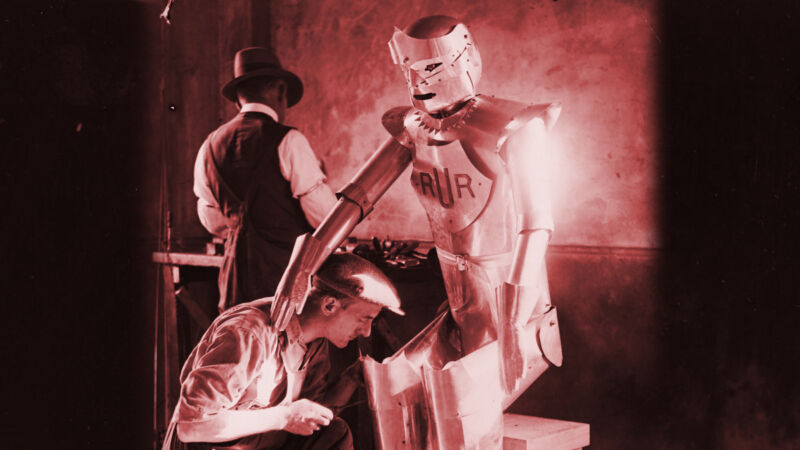
Enlarge / An assistant of inventor Captain Richards works on the robot the Captain has invented, which speaks, answers questions, shakes hands, tells the time and sits down when it's told to. - September 1928 (credit: Getty Images)
In 1921, Czech playwright Karel Čapek and his brother Josef invented the word "robot" in a sci-fi play called R.U.R. (short for Rossum's Universal Robots). As Even Ackerman in IEEE Spectrum points out, Čapek wasn't happy about how the term's meaning evolved to denote mechanical entities, straying from his original concept of artificial human-like beings based on chemistry.
In a newly translated column called "The Author of the Robots Defends Himself," published in Lidové Noviny on June 9, 1935, Čapek expresses his frustration about how his original vision for robots was being subverted. His arguments still apply to both modern robotics and AI. In this column, he referred to himself in the third-person:
For his robots were not mechanisms. They were not made of sheet metal and cogwheels. They were not a celebration of mechanical engineering. If the author was thinking of any of the marvels of the human spirit during their creation, it was not of technology, but of science. With outright horror, he refuses any responsibility for the thought that machines could take the place of people, or that anything like life, love, or rebellion could ever awaken in their cogwheels. He would regard this somber vision as an unforgivable overvaluation of mechanics or as a severe insult to life.
This recently resurfaced article comes courtesy of a new English translation of Čapek's play called R.U.R. and the Vision of Artificial Life accompanied by 20 essays on robotics, philosophy, politics, and AI. The editor, Jitka Čejková, a professor at the Chemical Robotics Laboratory in Prague, aligns her research with Čapek's original vision. She explores "chemical robots"—microparticles resembling living cells—which she calls "liquid robots."
Read 4 remaining paragraphs | Comments
